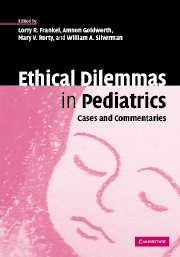Book contents
- Frontmatter
- Contents
- List of contributors
- Preface
- Introduction
- Part I Therapeutic misalliances
- Part II Medical futility
- 4.1 Letting go: a study in pediatric life-and-death decision making
- 4.2 Near-drowning, futility, and the limits of shared decision making
- 4.3 Topical discussion
- 5.1 Long-term ventilation in a child with severe central nervous system impairment
- 5.2 Autonomy, community, and futility: moral paradigms for the long-term ventilation of a severely impaired child
- 5.3 Topical discussion
- 6.1 Complexities in the management of a brain-dead child
- 6.2 The moral arena in the management of a brain-dead child
- 6.3 Topical discussion
- Part III Life by any means
- Part IV Institutional impediments to ethical action
- References
- Index
6.2 - The moral arena in the management of a brain-dead child
Published online by Cambridge University Press: 18 August 2009
- Frontmatter
- Contents
- List of contributors
- Preface
- Introduction
- Part I Therapeutic misalliances
- Part II Medical futility
- 4.1 Letting go: a study in pediatric life-and-death decision making
- 4.2 Near-drowning, futility, and the limits of shared decision making
- 4.3 Topical discussion
- 5.1 Long-term ventilation in a child with severe central nervous system impairment
- 5.2 Autonomy, community, and futility: moral paradigms for the long-term ventilation of a severely impaired child
- 5.3 Topical discussion
- 6.1 Complexities in the management of a brain-dead child
- 6.2 The moral arena in the management of a brain-dead child
- 6.3 Topical discussion
- Part III Life by any means
- Part IV Institutional impediments to ethical action
- References
- Index
Summary
Introduction
In the management of the brain-dead child discussed by Drs. Frankel and Randle we encounter descriptive anomalies and problems that are intimately connected with our moral posture toward brain death. I will discuss these anomalies and problems, and then consider whether brain death should continue to serve as the criterion of death, and whether the brain-dead individual should simply be called dead.
Descriptive problems
Let us consider some descriptive problems connected with this case. Notice that in describing this situation, the phrases, “prolonged medical support,” “medical interventions,” “attending physician,” and “life support” were employed. Indeed, it was difficult to do without them, since they are part of the conventional terminology.
Is the brain-dead child dead? Most physicians would say yes. (It is less clear whether an ordinary person would agree.) A human being, particularly in the early period of death, is also called a corpse (Pallis 1982, Annas 1996). If so, do we then believe that it is sensible to speak of ventilatory support of the brain-dead child as ventilating a corpse? If not, can we consider such support a form of treatment?
One response might be to point out that physicians treat organs, as well as people. But it is normally the treatment of the organs of the living, rather than those of the dead, patient. If we extend the use of the term “treatment” to the organs of the brain-dead, we may be giving credence to the view that the brain-dead individual is, in some sense, alive.
- Type
- Chapter
- Information
- Ethical Dilemmas in PediatricsCases and Commentaries, pp. 140 - 147Publisher: Cambridge University PressPrint publication year: 2005



